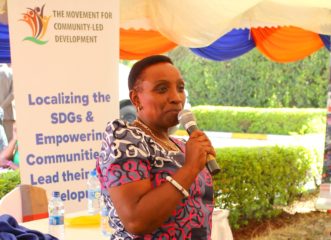“By having the courage to take the first step into rooms, circles, and conversations where you may feel like you don’t belong, you also open the door for others to contribute their diverse perspectives, creating more meaningful, collaborative solutions for today and beyond.”
Quote by Kim Vu
On March 8, 2019, The Hunger Project will stand with people around the world to recognize International Women’s Day, a day that honors the achievements of women and girls everywhere and calls on our global community to take action for equality.
Systemic discrimination keeps women in much of the world from joining the workforce. In India, for example, despite being 48% of the population, women represent only 24% of the paid labor force. This creates a cycle of social and economic dependency in which women are exclusively reliant on the earning power of the men in their lives. When those men lose that economic power — in instances of disability, advanced age or unemployment — entire families lose access to fundamental resources. It’s a fragile and unbalanced system that can’t stand up to economic hardship and is especially precarious in rural communities with little or no access to government services. Inequality directly results in social insecurity.
Which is why this year’s International Women’s Day theme is “Think equal, build smart, innovate for change,” challenging all of us to find innovative ways to advance gender equality and the empowerment of women, particularly in the areas of access to public services, sustainable infrastructure and social protection services such as economic buffers for unemployment and disability.
We live each day surrounded by the internet of things and in a state of permanent connectivity through social media because we are inherent innovators. This international Women’s Day, we call on each and every person to leverage those instincts to build better, more gender-balanced systems. Examples of what’s possible through innovation are evident around the world. For example, according to the IFC, in Sub-Saharan Africa, 11% of the population uses mobile banking, well above the world average of 2% and making economic engagement and empowerment possible for a rural population far beyond the reach of traditional banks.
At The Hunger Project, we are committed to innovating effective social protections at the national, regional, district and, especially, the local levels — where the informal and marginalized communities are most vulnerable.
This year, join us in standing with women and girls everywhere as they innovate to remove barriers and build a brighter, more balanced world.
What We Do

As Secretariat of the Movement for Community-led Development (CLD),we leverage partnerships with like-minded organizations around the world to take community-led development to “transformative scale” – beyond small projects, to a level that transforms society.
In India, The Hunger Project builds leadership skills among women who have been systematically denied information, freedom of motion and a voice in decision making. We support empowering the women electorate, encouraging voter participation among women and the election of women leaders to all panchayat (village council) seats.
At our epicenters across Africa, tens of thousands of women food farmers are increasing their incomes and strengthening their clout in the marketplace through our Microfinance Program, training, credit and savings program. Our Women’s Empowerment Program throughout Africa and specialized animator trainings worldwide empower women to seek positions of leadership and train all of our partners, women and men, to take responsibility for improving lives in their communities.
In Mexico, The Hunger Project works with isolated and marginalized communities, and the first step is always to engage in Vision, Commitment and Action Workshops to overcome mindsets of resignation and gender inequality in these areas where women face the double discrimination of being women and indigenous.
In Bangladesh, programs like our Safe School for Girls Campaign empowers students, teachers, parents and local communities to stop child marriages and promote opportunities for girls. Since the program’s launch, more than 25,000 people have been trained in Safe School for Girls workshops.
And, to support us achieving the most impact possible, our Women’s Empowerment Index is designed to measure progress in the multi-dimensional aspects of women’s empowerment, which better informs and improves empowerment programs.
